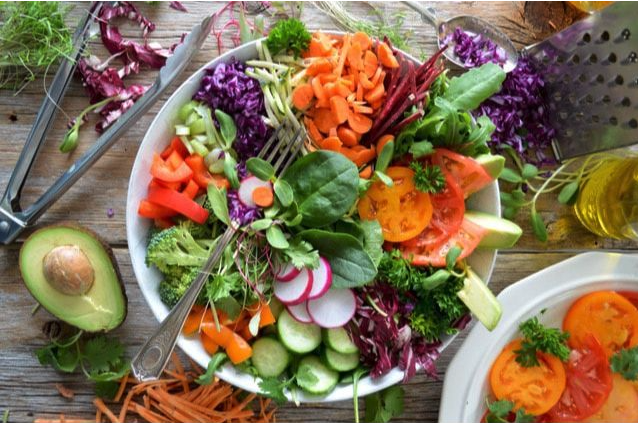This part two of the nutrition article in a series covering autoimmune disease. Don’t miss upcoming articles covering chronic infections, hormones, environmental medicine and mind body medicine. If you missed the first articles covering GI health or loneliness check those out! I have so much to say about nutrition I had to break it into two articles! Check out the first article here.
In part one of this article I reviewed several nutrients that benefit the immune system and the foods rich in those nutrients. In addition to looking at specific nutrients and how they impact our immune system we can also look at particular inflammatory mediators and discuss what foods or nutrients can be beneficial. One example is NF-κB, a well-known pro-inflammatory mediator. When NF-κB is deregulated, it’s associated with the chronic inflammation of autoimmune diseases. NF-κB has been implicated in a number of autoimmune diseases, such as rheumatoid arthritis, systemic lupus erythematosus, type I diabetes, multiple sclerosis and inflammatory bowel disease (1). Certain foods and nutrients modulate NF-κB, these include:
Foods that modulate NF-κB are just one example of how food can be our medicine. We could pick other important inflammatory mediators such as TNF-alpha or IL-6 and review which foods support a healthy response for these markers specifically. Instead of doing that I am hoping to convey that a whole foods diet rich in variety is supportive of a healthy immune system.
Let’s pivot to some components of our diet that can impair our immune system.
Moderation is important. But it’s also important to be realistic about what is truly food for humans and what is not. With the rise in packaged and convenience foods, we have been brainwashed to think that diet soda, boxed macaroni and cheese with a laundry list of unknown ingredients, and twinkies that never expire are food. Here's a baseline for determining food from not-food: if it wasn’t around for your great-grandmother to eat, it’s not food.
Food additives are particularly concerning and the amount of additives in our food has skyrocketed. A review article published in the journal Autoimmunity Reviews in 2015 found that changes in intestinal tight junction permeability (i.e. 'leaky gut') are associated with industrial food additives and may explain the rising incidence of autoimmune disease. (2) We must be vigilant in reading food labels and striving to minimize our consumption of processed foods.
There are two more things we must cover when discussing nutrition and autoimmune disease: sugar and alcohol. Both of these were around for your great-grandmother to consume, but we are indulging in much higher quantities and to our detriment. Sugar and alcohol are good examples of where we need more moderation. Many people end up eating much more sugar than they realize because it’s hidden in so many of our packaged foods and beverages. Start bringing more awareness to your sugar intake by reading ingredients and nutrition labels on packaged food that you purchase. Sugar is inflammatory, can contribute to ‘leaky gut,’ and is damaging to our immune system.
Note: When I use the word ‘sugar’ I am talking about refined products such as sugar cane, beet sugar, corn syrup, dextrose, maltodextrin, rice syrup etc. I am not talking about fruit. I see fruit lumped into the ‘sugar’ category and demonized right along with it so I want to be clear - fruit is an important part of a balanced diet.
Regular and excessive use of alcohol is normalized in our culture. Unfortunately, alcohol is very irritating to the GI lining, depletes the body of nutrients, and impairs our immune system. This is a link to a chapter in a medical text that walks through how alcohol impairs the immune system. Be forewarned, there are MANY complicated mechanisms. Safe alcohol consumption is no more than 1 drink per day for women and 2 drinks per day for men. A binge is drinking 4 or more beverages in 2 hours and 1 in 6 US adults binge drink 4 times or more per month (3). Excessive alcohol use is a problem in our country and, unfortunately, the stress of a pandemic is exacerbating this problem. If you find yourself drinking more than usual, consider other activities to help manage your stress such as an Epsom salt bath, exercise, time with friends, etc. If you need help to reduce your drinking, please consider talking to your doctor or mental health professional.
Many of the ‘diets’ found on the internet claiming to treat autoimmune disease focus heavily on what you should avoid. I hope this article has helped you see that instead of looking at tomatoes or other whole foods as a major culprit we should be looking to food additives, sugar and alcohol. There are so many critical nutrients for our immune health and eating a wide variety of foods is our best chance for adequate consumption.
In part one we reviewed critical nutrients to support the immune system and in part 2 we reviewed non-food compounds that can damage the immune system such as additives, sugar and alcohol. But we haven’t talked about the middle ground: foods that are inflammatory for some folks and not others. This is where individualized medicine comes in. Some people react poorly to dairy and it could be part of the problem. Other folks consume dairy without issue. I’ve even experienced a case where garlic was the migraine trigger. We are all unique and what foods nourish our bodies is different person to person. So before you jump on a ‘one size fits all’ diet plan for autoimmune disease, consider consulting with a professional who can help guide you.
Resources:
- Green tea
- Curcumin
- Rosemary
- Grapeseed extract
- Selenium (brazil nuts)
- Indole-3-Carbinol (cruciferous veggies)
- GLA (hemp and borage oil)
- Zinc (pumpkin seeds, oysters, beef)
Foods that modulate NF-κB are just one example of how food can be our medicine. We could pick other important inflammatory mediators such as TNF-alpha or IL-6 and review which foods support a healthy response for these markers specifically. Instead of doing that I am hoping to convey that a whole foods diet rich in variety is supportive of a healthy immune system.
Let’s pivot to some components of our diet that can impair our immune system.
Moderation is important. But it’s also important to be realistic about what is truly food for humans and what is not. With the rise in packaged and convenience foods, we have been brainwashed to think that diet soda, boxed macaroni and cheese with a laundry list of unknown ingredients, and twinkies that never expire are food. Here's a baseline for determining food from not-food: if it wasn’t around for your great-grandmother to eat, it’s not food.
Food additives are particularly concerning and the amount of additives in our food has skyrocketed. A review article published in the journal Autoimmunity Reviews in 2015 found that changes in intestinal tight junction permeability (i.e. 'leaky gut') are associated with industrial food additives and may explain the rising incidence of autoimmune disease. (2) We must be vigilant in reading food labels and striving to minimize our consumption of processed foods.
There are two more things we must cover when discussing nutrition and autoimmune disease: sugar and alcohol. Both of these were around for your great-grandmother to consume, but we are indulging in much higher quantities and to our detriment. Sugar and alcohol are good examples of where we need more moderation. Many people end up eating much more sugar than they realize because it’s hidden in so many of our packaged foods and beverages. Start bringing more awareness to your sugar intake by reading ingredients and nutrition labels on packaged food that you purchase. Sugar is inflammatory, can contribute to ‘leaky gut,’ and is damaging to our immune system.
Note: When I use the word ‘sugar’ I am talking about refined products such as sugar cane, beet sugar, corn syrup, dextrose, maltodextrin, rice syrup etc. I am not talking about fruit. I see fruit lumped into the ‘sugar’ category and demonized right along with it so I want to be clear - fruit is an important part of a balanced diet.
Regular and excessive use of alcohol is normalized in our culture. Unfortunately, alcohol is very irritating to the GI lining, depletes the body of nutrients, and impairs our immune system. This is a link to a chapter in a medical text that walks through how alcohol impairs the immune system. Be forewarned, there are MANY complicated mechanisms. Safe alcohol consumption is no more than 1 drink per day for women and 2 drinks per day for men. A binge is drinking 4 or more beverages in 2 hours and 1 in 6 US adults binge drink 4 times or more per month (3). Excessive alcohol use is a problem in our country and, unfortunately, the stress of a pandemic is exacerbating this problem. If you find yourself drinking more than usual, consider other activities to help manage your stress such as an Epsom salt bath, exercise, time with friends, etc. If you need help to reduce your drinking, please consider talking to your doctor or mental health professional.
Many of the ‘diets’ found on the internet claiming to treat autoimmune disease focus heavily on what you should avoid. I hope this article has helped you see that instead of looking at tomatoes or other whole foods as a major culprit we should be looking to food additives, sugar and alcohol. There are so many critical nutrients for our immune health and eating a wide variety of foods is our best chance for adequate consumption.
In part one we reviewed critical nutrients to support the immune system and in part 2 we reviewed non-food compounds that can damage the immune system such as additives, sugar and alcohol. But we haven’t talked about the middle ground: foods that are inflammatory for some folks and not others. This is where individualized medicine comes in. Some people react poorly to dairy and it could be part of the problem. Other folks consume dairy without issue. I’ve even experienced a case where garlic was the migraine trigger. We are all unique and what foods nourish our bodies is different person to person. So before you jump on a ‘one size fits all’ diet plan for autoimmune disease, consider consulting with a professional who can help guide you.
Resources:



 RSS Feed
RSS Feed